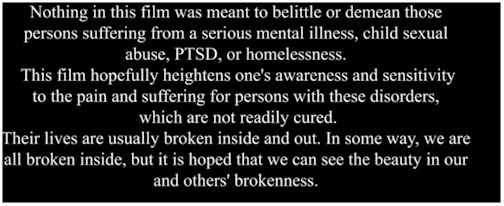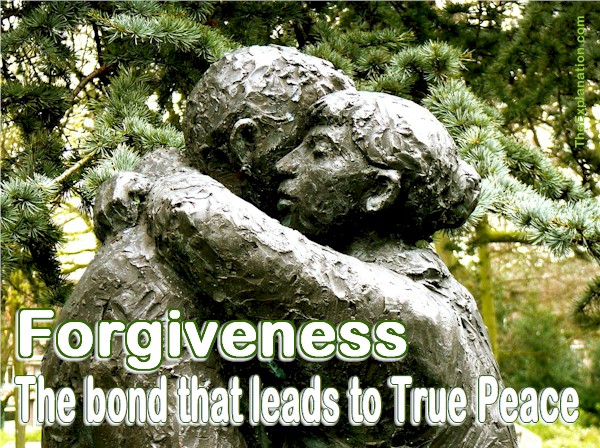Contents
Forgiveness, the last of the 7 steps of how humankind functions, is the healer, that alone leads to true peace.
To reach the seventh step of forgiveness, let’s resume the six-step scenario of how humankind functions. Let’s especially see the casualties strewn out–the consequences–along this arduous path to peace.
(Audit of Humankind, chapter 2.12)
Here are the first 6 points and the confusion they sow.
- Human nature. Humankind’s dual-faced nature which we’ve all both expressed and been the brunt of. We’re all carrying our own wrong-doing burdens or the scars of someone else’s negativity.
- Free will. What wrong choices, that could’ve been avoided, have you made that took a fellow human being down? Likewise, someone, maybe a number of other friends or foes have decided, willingly or unwittingly, to put obstacles in your way.
- Behavior. Your dastardly acts, yes, they may be few, they may be many have hurt, and maybe/probably much more, physically, emotionally, mentally those you love and those you frequent. You yourself have been the target of psychological manipulation and worse maybe by parents, family members, colleagues…
I could insert many daily incidents to illustrate this. I won’t. You undoubtedly have a list in your mind. - Ethics. The rules to play life by. Who decides what they are? Your parents, teacher, spouse, employer, country? You know these rules are not always equitable? You have had to bite the bullet as we say. You haven’t always followed the rules and likewise for others with regard to you.
- Justice We all need correcting. Sometimes it’s harsh and unjust, sometimes absent when needed. How justice is applied and by whom affects your relationship with those who are supposedly responsible for your well-being.
- Self-reproach. How many times have you said to someone close, “I won’t do that again … I promise,” only to fall into the trap oh so soon after? Each of us repeats deplorable actions, remains enmeshed in a bad habit we can’t shunt off hurting someone or those of our entourage. Here you have difficulty forgiving yourself for your misconduct. You’ve also been the punching bag after numerous crying bouts by people who say they’re sorry and sound like they mean it.
Yes, I’ve voluntarily painted a rather bleak picture of how humans function. Because not one of us can say we have not gone through rough times with regard to each of these six steps. Understand what I’m saying here. These steps in how humans function are givens, they govern our interpersonal relationships. Each of these six steps has an essential role to play.
Because humans are human, we are very imperfect in the application of how humans function. That’s why we need forgiveness.
Even if all the steps were applied perfectly by others (which is certainly not the case) we’d still need forgiveness. Why? Because first and foremost forgiveness has to be applied to yourself.
You’re walking around right now carrying a huge burden of guilt. If you have the least amount of sensitivity towards those in your entourage, your family, children, parents, grandchildren, grandparents, aunts, uncles cousins … not to mentions all your friends, colleagues and acquaintances. You know you’ve done them wrong to one extent or another. No details, because you know the details. When you wake up and become aware of this situation or a family member or friend makes you aware of a situation and step 6, self-reproach, kicks in … that’s when guilt hits. You’re sorry for your wrong-doing and depending on the extent of damage you’ve caused that guilt can be overwhelming. That’s where forgiveness of oneself starts.
Forgiveness is the follow-on after self-reproach. Part of trying to repair the damage is re-opening and re-establishing communication. The presence of guilt is a hindrance. The remedy is a good dose of forgiveness.
In this expose of the seven phases of how humans function my intention is not to explain how to overcome the negative and exert the positive. In Audit of the Universe, I’m still turning over the pieces of the puzzle. It’s impossible to fix a problem if you don’t know what you’re working with. To reach peace for humankind we have to first know how we function. That is the sole point of this chapter. To explain WHAT the seven steps are.
In Origin of Humankind, I will not only explain HOW to reach peace but especially WHY each of these seven steps exists and is an essential part of humankind’s development and future.
Self-reproach and forgiveness
Just as ethics and justice are tied together (the rules and the means to apply them) so self-reproach and forgiveness are tied together.
First comes the realization in an individual that a change of habits or life-direction is necessary. Once the intent is there it’s accompanied by an effort to modify one’s behavior–that’s self-reproach. Only when this sixth step is initiated can an individual begin to forgive themselves for their past errors. Only when self-reproach has been initiated by someone who’s done you wrong can you begin the process of forgiveness.
Self-reproach is getting a handle on and beginning to master one’s human nature (step 1) and choices (step 2) of conduct. This gives rise to improved behavior which opens the way to forgiveness. Change and forgiveness go hand-in-hand.
Human nature and choices (steps one and two) can and do happen effortlessly. It doesn’t take much to unleash negativism and make irrational choices leading to fraught behavior. To the contrary, it takes concerted personal awakening, inner-fortitude, and outward-effort to exercise self-reproach and forgiveness (steps six and seven). The two ultimate steps of how humans function are a personal about-face decision of the first two steps.
Forgiveness caps off the entire process because it alone can begin to overcome and wipe away all the tears and hurt each one of us has been subjected to during our entire lives. This can take time, much time, but forgiveness alone permits a reduction and eventual eradication of negative thoughts in your mind.
Yes, it all comes back to our minds. That’s where human nature and free will choices grip and manipulate us. At some point, it’s also in our minds that we decide to turn our lives around which includes beginning to forgive ourselves and others for wrongdoings. Ultimately we’re looking for that forgiveness that leads to peace of mind for all parties.
I’d like to share this movie with you. Our human nature and free will have broken all of us. If you don’t know that, you just haven’t realized it yet. This film is about the worlds of a depressed psychologist and an emotionally disturbed homeless woman that collide. While trying to rescue her they fall in love, and each gets a second chance at a new life. It shows how proper personal self-reproach and a good dose of forgiveness lead to peace.

Beauty in the Broken. A moving film that illustrates the need for forgiveness and acceptance.
Forgiveness is not easy and it poses many difficult questions. In our perfectly assembled puzzle, these questions require answers. They shall be forthcoming.
- Here’s a scenario. Peter slaps Mary, Mary forgives Peter. He slaps her again. This happens repeatedly. Is this ok or not?
- Should you, and how can you determine the sincerity of an offender?
- What if an individual wants to apply new resolutions but doesn’t have enough character to do so?
- What do you do if an offense continues to be repeated?
- Is there a point of no return?
- What if an individual or group has crossed this point and has made up their mind to not self-reproach?
- Is there a point when forgiveness is no longer possible?
- How do you handle someone who refuses forgiveness?
It is this inner functioning of humans, with every single influence of heredity and environment that makes us the imperfect humans we are–that mixture of human nature, free will, and behavior. Ethics, justice, and self-reproach can be and generally are far from perfect, adding to our human frailties. To begin to clear up bad feelings, and worse, that have been created, the final ingredient, forgiveness, must be added, well kneaded, and well mixed-in to bind humanity. We’ll need an immense portion to reach coherent completeness of humankind.
Ultimately forgiveness is the one element that restores communication and calmness and finally peace between people and peace of mind.
This blog post is an excerpt from chapter 2.11 of the book Audit of Humankind.
Dig Deeper into The Explanation
Join The Explanation Newsletter to stay informed of updates. and future events. No obligations, total privacy, unsubscribe anytime, if you want.
Online Study Courses to Unlock Bible meaning via Biblical Hebrew… with no fuss. Free video courses that put you in the driver’s seat to navigate the Bible as never before. Join now
The Explanation series of seven books. Free to read online or purchase these valuable commentaries on Genesis 1-3 from your favorite book outlet. E-book and paperback formats are available. Use this link to see the details of each book and buy from your favorite store.
Since you read all the way to here… you liked it. Please use the Social Network links just below to share this information from The Explanation, Forgiveness, the Healing Bond for Humans to Function Peacefully



Trackbacks/Pingbacks